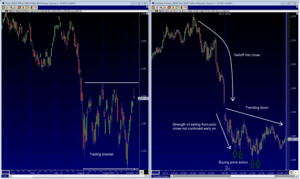Having a plan for what we think the market may do can be an important tool for a trader to succeed. But human emotions can at times get in the way and make us hold onto an idea by stopping us from seeing deviations in the market that change the prospects of the plan. Sometimes it’s purely that in the moment of the trade it’s difficult to work out whether changes have occurred in the market or it’s just the theatre of the trading day playing out in its sometimes confusing and disorientating manner.
I have seen and heard of many a trader who has a good run then is wiped out. Why? Because they find something that seems to work for them really well but when that ends, they aren’t flexible enough to change the plan or at least have an alternative to turn to. My belief is that we should always have flexibility in our trading to give ourselves the best chance to survive and prosper.
Here are some simple yet important ideas to help you maintain your flexibility:
- Don’t trade when you haven’t prepared thoroughly. If you haven’t prepared and you don’t know what to expect, you are less likely to be able to adapt your view of the market quickly and appropriately.
- Don’t trade when you are tired or emotional. This is probably my biggest source for being stubborn in my trading. It is a trigger for a less aware and more emotional state that is often blinding of reality.
- Be aware of the big picture as well as the small. Having an adaptable plan is often about looking beyond just what and how you trade. Understanding the market from different types of participants’ perspectives can give you a variety of ideas to study.
- Plan for alternatives so that if you see deviation, you still have solid reasoning for what the market may do. Decide that the market has shown a different agenda and trade it without a careful plan and you may be asking for trouble.
- Try to have a ‘break clause’ for your plan. Know the elements of the market that are telling you its story. Understand where these elements may appear to help confirm your plan and things that may persuade you to switch to a different plan. Watch the market for these tells through your trading timeframe and you’ll see the plot unfold before you.
- Don’t be behind the curve. If you are chasing an entry or an exit, you are far less likely to be able to see what is going on. The real cost of missing an entry is often not about missed profits, but how it changes your emotional balance.
- Monitor your strategy over time. If you don’t, you’ll be less aware of mistakes and how much they cost you. You’ll also be less aware of changing market conditions. Traders who don’t fully observe their strategy’s performance often complain about the market being poor rather than looking to see if there’s a better way to trade the current conditions.
Here is a simple example from Thursday 13th October 2011. Quite near the top of its recent bracket, the E-mini S&P 500 clearly sold off into the 4:15pm EST close. One of my scenarios was a possible selloff. The plan was if I could get a test of the prior day’s late selloff and gauge strength, I might go short to position myself for a further move down. Weakness on open and I’d be waiting for a move back up of some sort to see whether or not the selling could persist. So what happened was there was selling early on, but not to the same extent as I had thought. This was the first sign to me that a bigger selloff wasn’t about to happen. The next sign was when price had got into the Monday/Tuesday range, price action was suggesting buying. All this was happening while the trend was still down. The 3 min chart to the right was where I switched my view and started looking for long entry points for a test back into Thursday’s range.
The market does what it does regardless of what you expect. Get it right and you might profit, get it wrong and you will lose. So whenever you trade you have to think in probabilities. Not the probability of what the market may do, but the probability of your judgment of the market being correct. Take each and every action of the market as piece of information. When you lose on a trade, if you have thought it out well and you have a sound strategy, that information is golden. It’s probably cost you a lot too, so make sure you use it well! When you start doing this, you’ll see that there are many different ways a market can behave and you’ll be much better positioned to profit even when situations arise which you felt were less likely to occur.
Trade well.
